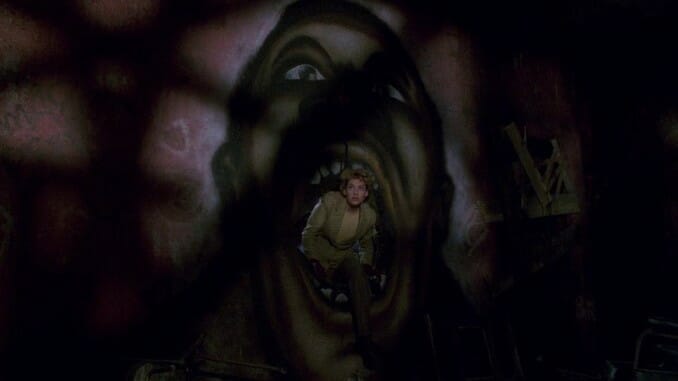In the Original Candyman, Curiosity Is Recognized as Transgression (and Dealt with Accordingly)

In Bernard Rose’s 1992 classic Candyman, protagonist Helen Lyle (Virginia Madsen), a Chicago semiotics grad student, is guilty of several sins. The first is curiosity. While this classic plot-driving character trait might seem a pretty pardonable one, in horror, curiosity is often the key that puts the protagonist in a position to suffer for their other, more egregious sins. While Helen’s second offense—poverty tourism in service to academia—is still more cardinal than mortal, it’s her third that is the worst: Writing off American history as just a story, because when the history is about slavery, no story is “just” a story, even tall tales and urban legends.
Curiosity is an essential ingredient of the 1992 Candyman; it’s also the root from which the rest of Helen Lyle’s transgressions grow. For his part, Rose seems to recognize how interrelated the not-so-separate offenses are, and it’s his tight, unwavering focus on this cluster of trespasses and consequences that has cemented the original Candyman in horror canon. The film takes the idea of a white interloper treading ground they have no business setting foot on and follows it through to its logical end. As befits the genre, the lesson here is harsh: Don’t go poking around in dark places, else what you find might bite you on the ass, or perhaps fillet you with a hook.
Helen spends the first chapter of Rose’s film doggedly researching her thesis about urban legends and specifically the tale of the Candyman, the son of a slave who matured into a gifted painter sought after by the white slaver class for his talents in portraiture. The saga goes downhill from there. He fell in love with a white woman and after fathering her child, a white mob chased him down and murdered him at the behest of the woman’s outraged dad. Now, when anyone says the man’s name five times in a mirror, his ghost appears and splits them “from groin to gullet,” as Candyman (living legend Tony Todd) rumbles in voiceover early on in the film. Helen thinks it’s all hokum. She’s so certain of it, in fact, that her efforts to mine his mythos to report on urban legends in urban spaces provoke his emergence, and inspire a unique punishment for her: Instead of just gutting her, he wreaks havoc on her life by going on a murder bender and framing her for the carnage.
First he kidnaps baby Anthony, son of Anne-Marie (Vanessa Estelle Williams), a resident of the Cabrini-Green housing project, and beheads her Rottweiler to rub salt in the wound. Then he slays Helen’s best friend, Bernadette (Kasi Lemmons). With all her remaining friends and family, including her husband, Trevor (Xander Berkley), convinced she’s off her rocker, Helen ends up in a psychiatric hospital, where Candyman cleans her doctor like a fish, which miraculously changes nobody’s mind about Helen’s culpability.
-

-

-

-

-

-

-

-

-

-

-

-

-

-

-

-

-

-

-

-

-

-

-

-

-

-

-

-

-

-

-

-

-

-

-

-

-

-

-

-








































